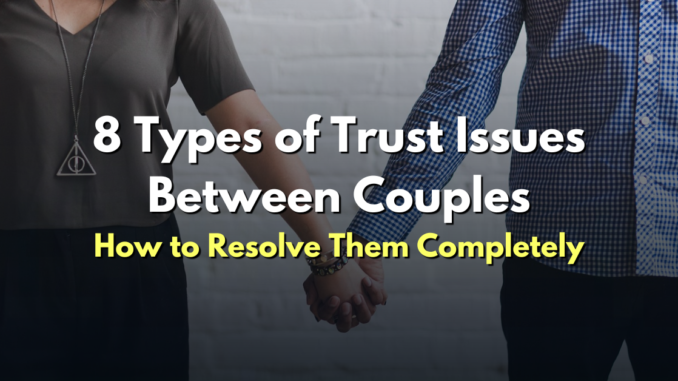
Trust forms the foundation of any healthy relationship. It serves as the cornerstone upon which love, intimacy, and security are built. Despite its significance, many couples struggle with a lack of trust. This article will explore the complex nature of trust issues in romantic relationships. We will examine their types, causes, and consequences. We will also look at potential pathways to healing. Using psychological insights and therapeutic approaches. Our goal is to offer guidance to couples seeking to restore trust and intimacy in their bond.
Key Points
- Roots of Trust Issues: Trust issues arise from past betrayals, childhood experiences, and personality traits, leading to emotional barriers.
- Types of Trust Issues: Infidelity, communication breakdowns, inconsistent behavior, secrets, past trauma, attachment styles, jealousy, and external influences can all erode trust.
- Impact on Relationships: Lack of trust disrupts communication, intimacy, and satisfaction, causing suspicion, defensiveness, and conflict.
- Rebuilding Trust: Rebuilding trust requires open communication, transparency, consistency, and practical strategies like trust-building exercises and therapy.
- Long-Term Effects and Solutions: Unresolved trust issues can lead to conflict and relationship breakdowns. Addressing them through empathy, understanding, and professional support helps restore trust.
Causes and Origins:
Trust issues within relationships often have deep-seated roots, arising from a variety of sources. Past betrayals, whether real or perceived, can sow seeds of doubt and insecurity, leading individuals to erect emotional barriers as a means of self-protection.
Childhood experiences, such as inconsistent caregiving or parental discord, may also contribute to the development of trust issues later in life. Moreover, personality traits such as fear of vulnerability or attachment styles shaped by early relational patterns can exacerbate feelings of mistrust within romantic partnerships.
Effects on Relationship Dynamics:
A lack of trust has big consequences in a relationship. It makes communication, intimacy, and satisfaction suffer. When trust is gone, partners become suspicious and defensive. This stops them from truly connecting and being open. Resentment grows, intimacy fades, and conflicts get worse. Trust falls apart, leaving both people feeling lost and uncertain.
8 Types of Trust Issues Between Couples
Infidelity:
One of the most devastating breaches of trust within a relationship, infidelity involves one partner engaging in romantic or sexual relationships outside the committed partnership. The discovery of infidelity can shatter trust at its core, leading to profound feelings of betrayal, insecurity, and emotional trauma.
Communication Breakdown:
Trust weakens when partners don’t communicate well. This can happen by hiding information, avoiding tough talks, or being dishonest about thoughts, feelings, or actions. When communication isn’t open and honest, partners feel disconnected and unsure about each other’s intentions.
Inconsistent Behavior:
Trust issues can arise when one partner exhibits inconsistent behavior or fails to follow through on commitments and promises. This inconsistency breeds uncertainty and doubt, undermining the sense of reliability and dependability that is essential for trust to thrive.
Secrets and Withholding Information:
When one partner keeps secrets or withholds information from the other, it can create a sense of secrecy and suspicion within the relationship. Whether it’s hiding financial matters, past experiences, or personal struggles, withholding information can chip away at the foundation of trust and intimacy.
Past Trauma and Insecurities:
Trust issues may stem from past experiences of trauma, such as betrayal, abandonment, or emotional abuse. These unresolved wounds can manifest as deep-seated insecurities and fears of vulnerability, making it difficult for individuals to trust and fully open up to their partners.
Attachment Style Differences:
Attachment styles affect trust in relationships. Anxious partners fear abandonment and seek reassurance. Avoidant partners struggle with intimacy, causing distance and mistrust. These differences, based on past experiences, shape how trust is perceived and handled in relationships.
Jealousy and Control:
Excessive jealousy and controlling behavior can also undermine trust within a relationship. When one partner exhibits possessive tendencies, monitors the other’s actions, or restricts their autonomy, it can breed resentment and erode the foundation of mutual respect and trust.
External Influences:
Trust issues may be exacerbated by external influences such as cultural norms, societal pressures, or past experiences. For example, individuals who have experienced trauma or betrayal in previous relationships may carry unresolved trust issues into their current partnership, impacting their ability to trust and be trusted.

How to Resolve These Issues?
Rebuilding Trust:
Rebuilding trust is hard but possible. It starts with open, honest communication. Partners need to bravely talk about their fears and weaknesses in a safe, supportive space.
Transparency, consistency, and accountability are the most important factors, as actions speak louder than words in rebuilding fractured trust. Patience and empathy must be cultivated, as healing takes time and requires a willingness to extend grace and understanding to oneself and one’s partner.
Individual Perspectives:
Trust, or lack of trust, is very personal. It’s shaped by our own views, beliefs, and past. Each partner sees trust differently, influenced by things like their past, culture, and insecurities.
By acknowledging and validating each other’s perspectives, couples can promote empathy, as well as deepen their understanding of the complexities surrounding trust within their relationship.
Trust-Building Exercises:
Practical exercises help rebuild trust. Couples can try activities to promote empathy, active listening, and mutual openness.
Trust-building exercises, such as sharing personal narratives, practicing non-judgmental communication, or engaging in joint problem-solving tasks, can create opportunities for partners to deepen their connection and rebuild trust from the ground up.
Therapeutic Approaches:
For couples struggling to manage trust issues, seeking professional guidance can be useful in starting the healing process and growth in their relationships. Couples therapy offers a safe and supportive space where partners can explore their feelings, address underlying conflicts, and learn effective communication and problem-solving skills. Individual therapy may also be beneficial for addressing underlying issues such as trauma, anxiety, or attachment difficulties that contribute to trust issues within the relationship.
Personal Stories:
Real-life examples and case studies serve as powerful tool in order to resolve trust issues of a couple. By sharing stories of couples who have confronted and overcome trust issues, we highlight the resilience of the human spirit and offer hope and inspiration to those embarking on their journey towards trust restoration.
Rebuilding trust isn’t a walk in the park; it’s a journey filled with hurdles. But among these challenges lies an opportunity for profound growth, deeper intimacy, and stronger connections between partners. How? Well, it starts with communication: open, honest, and transparent. Listening with empathy and understanding each other’s perspectives also plays a crucial role. And when things get tough, seeking professional help can provide valuable guidance and support. By following these steps, couples make the way for rebuilding trust and laying down a foundation built on mutual respect, intimacy, and security in their relationship.
Content on this blog, including text, some images, and other creative works, is the intellectual property of Dnyan Power and is protected by copyright law. Unauthorized use or reproduction of any content without prior written permission is strictly prohibited. For inquiries or permissions, please Contact Us or email us at quantumhypnosisplr@gmail.com


Leave a Reply